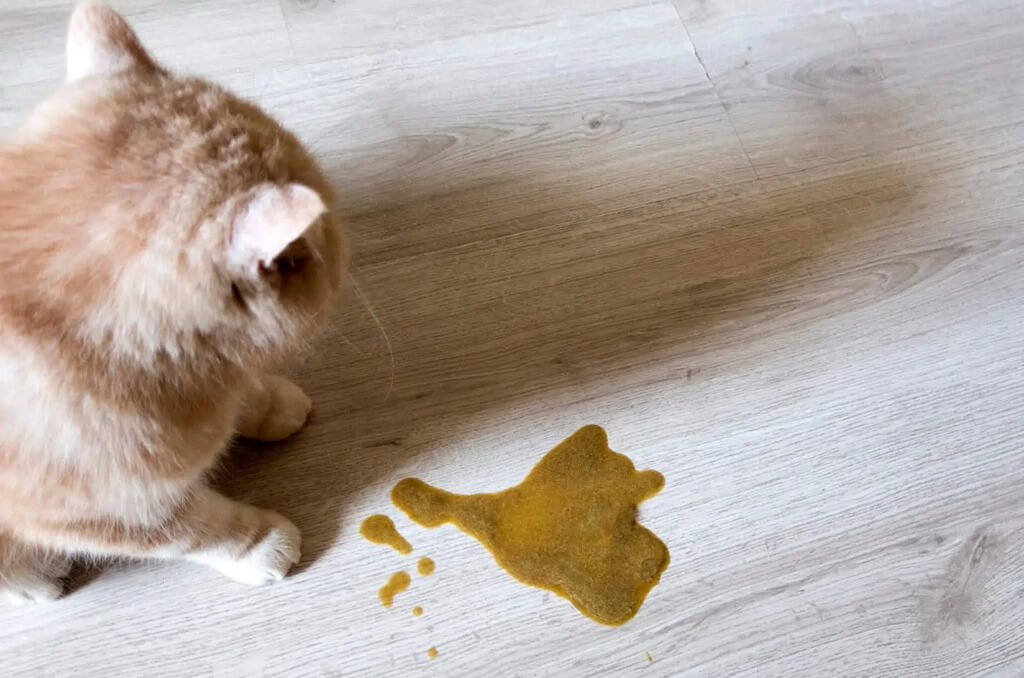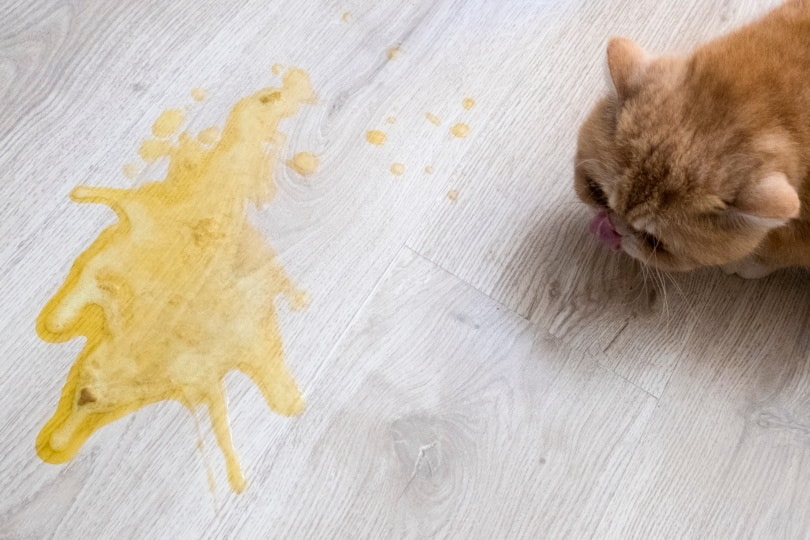If your cat just threw up and you’re staring at a mess on the floor, wondering what it means, you’re not alone. Vomiting is pretty common in cats, but the color of what they’re spitting up can actually tell you a lot. That’s where the cat vomit color chart comes in handy—it helps you quickly interpret what’s going on with your furry friend. Whether it’s white foam, yellow bile, or something more concerning like red or brown, each color has a different story to tell.
Some cats will throw up once in a while and be totally fine, but other times, it can signal something more serious. As a cat owner, knowing the difference between a one-off upset and a possible emergency is key. That’s where understanding the vomit color chart becomes super useful.
So, you’re not just looking at a mess—you’re actually getting a snapshot of your cat’s health. The colors can indicate everything from hairballs and empty stomach irritation to more severe issues like internal bleeding or ingestion of something toxic. This article breaks down what each color means and when you should be concerned.
- Everything You Need To Know About Meg Beirnes Taylor
- Jay Shetty A Journey Of Inspiration Growth And Meaning
- Is Panda Express Healthy
- Unveiling Russell Peters Net Worth Family And Life Beyond Comedy
- Who Is Michael Symon Brother Sister Nikki
Table of Contents
- What Is Cat Vomit and Why Does It Happen?
- The Cat Vomit Color Chart: A Quick Reference
- Common Causes Behind Different Vomit Colors
- When to Call the Vet: Signs to Watch For
- How to Prevent Cat Vomiting
- Frequently Asked Questions
What Is Cat Vomit and Why Does It Happen?
Cats throw up for all sorts of reasons—some normal, some not. It’s pretty normal for them to occasionally spit up a hairball or regurgitate food they ate too fast. But when it happens more than once or twice a month, or if the vomit looks unusual, that’s when you should pay closer attention.
Vomiting is the body’s way of getting rid of something it shouldn’t have. Sometimes, it’s just a quick clean-out. Other times, it can point to issues like food intolerance, allergies, parasites, infections, or even chronic conditions like kidney disease or pancreatitis. So while it might seem gross, it’s actually your cat’s way of saying something’s off.
The Cat Vomit Color Chart: A Quick Reference
Here’s a simple breakdown of the most common vomit colors and what they usually mean:
- How To Craft A Compelling Jillian Babyteeth4 Bio Age Height Single Nationality
- Winnie The Pooh Crocs
- Halifax Stanfield International Airport
- Littlefinger Game Of Thrones
- Portable Air Conditioner Costco
| Vomit Color | Possible Cause |
|---|---|
| Clear or Foamy White | Empty stomach irritation or hairball |
| Yellow or Greenish | Bile from an empty stomach or possible intestinal issue |
| Brown | Digested food or something they shouldn’t have eaten |
| Red or Pink | Presence of blood—could be a serious issue |
| Undigested Food | Eating too fast or digestive problem |
Of course, color alone isn’t enough to diagnose your cat. You’ll also want to look at how often they’re vomiting, how they’re acting afterward, and if there are other symptoms like diarrhea, lethargy, or loss of appetite.
Common Causes Behind Different Vomit Colors
Let’s break it down a little more so you can get a clearer picture of what’s going on with your cat.
White or Foamy Vomit
This kind of vomit usually shows up when a cat’s stomach is empty. Sometimes, it’s just a hairball making its way out. Other times, it means the stomach is irritated from acid buildup. If your cat does this occasionally, you can try feeding them smaller meals more often to keep their stomach from being empty for too long.
Yellow or Greenish Vomit
That’s usually bile, a fluid made by the liver and stored in the gallbladder. When the stomach is empty for too long, bile can irritate the stomach lining. If you see this color often, it might be worth talking to your vet about possible dietary changes or underlying issues like inflammatory bowel disease.
Brown Vomit
Brown vomit often looks like coffee grounds and can be a sign of digested blood. That’s not something to ignore. It can come from ulcers, gastrointestinal bleeding, or even ingestion of something toxic. If you see brown vomit, especially if your cat seems unwell, it’s time to call your vet right away.
Red or Pink Vomit
That’s fresh blood. It can come from the upper digestive tract and is a red flag—literally. This could be due to stomach ulcers, trauma, or something serious like a blood clotting disorder. Definitely not something to wait on.
Undigested Food
If your cat is throwing up food shortly after eating, they might be scarfing it down too fast. Try using a slow-feeder bowl or feeding them smaller amounts more often. If it keeps happening, though, it might point to a food sensitivity or digestive issue.
When to Call the Vet: Signs to Watch For
Not every vomit incident means a trip to the vet, but some signs definitely do.
- Vomiting more than once or twice a week
- Acting sick or unusually tired
- Not eating or drinking
- Repeated vomiting without producing anything
- Vomit with blood or a strange color
- Diarrhea or other digestive issues
If your cat is showing any of these signs along with unusual vomit, it’s best to get them checked out. Early diagnosis can make a huge difference, especially if there’s something serious going on.
Also, if your cat is trying to vomit but nothing comes up, that’s a sign of a possible blockage, which is a medical emergency. Cats can’t tell us what’s wrong, so it’s up to us to read the signs.
How to Prevent Cat Vomiting
While you can’t stop every single vomiting episode, there are a few things you can do to reduce how often it happens:
- Feed high-quality food: Look for a balanced diet with minimal fillers and artificial additives.
- Keep meals small and frequent: This helps keep the stomach from being empty for too long.
- Brush your cat regularly: This reduces hairballs and keeps their coat healthy.
- Use a slow-feeder bowl: Especially helpful for cats that eat too fast.
- Provide fresh water: Hydration is key for overall health and digestion.
Also, make sure there’s no toxic food or plants around the house. Chocolate, onions, garlic, and certain houseplants can all be dangerous for cats. Keep an eye out for anything they might get into.
If your cat is older, regular vet checkups are even more important. Older cats can develop issues like kidney disease or diabetes that might show up through vomiting or changes in appetite.
Frequently Asked Questions
Is it normal for cats to vomit once a month?
Occasional vomiting—like once a month—is fairly common in cats, especially if it’s just hairballs or they ate too fast. However, if it happens more often or seems to bother them, it’s worth checking with your vet.
What should I do if my cat throws up blood?
Seeing blood in your cat’s vomit is alarming, and for good reason. It could be a minor irritation or something more serious. Either way, contacting your vet right away is the safest bet.
Can diet changes help with cat vomiting?
Yes, diet plays a big role. Some cats are sensitive to certain ingredients like grains or artificial preservatives. Switching to a high-quality, limited-ingredient food might make a big difference.
Want to learn more about how to keep your cat healthy and happy? Learn more about cat care tips on our site.
Related Resources:



Detail Author:
- Name : Marques Casper
- Username : henry.wisoky
- Email : delmer11@yahoo.com
- Birthdate : 1982-08-23
- Address : 86254 Percy Stravenue Letitiaside, MO 53076-0548
- Phone : 806-504-2856
- Company : Keeling-Boehm
- Job : Dentist
- Bio : Et voluptates minus alias ab aut culpa. Quo itaque quia eius est. Ratione id veritatis fugit accusantium vitae voluptatem.
Socials
facebook:
- url : https://facebook.com/kayden5452
- username : kayden5452
- bio : Dolor suscipit dolorum quod sit perspiciatis culpa.
- followers : 5318
- following : 1337
twitter:
- url : https://twitter.com/kaydenmayert
- username : kaydenmayert
- bio : Qui repellat autem libero labore sed qui. Voluptatem quia veritatis occaecati qui vero. Quam deleniti harum dolores nesciunt dolor.
- followers : 6402
- following : 1635